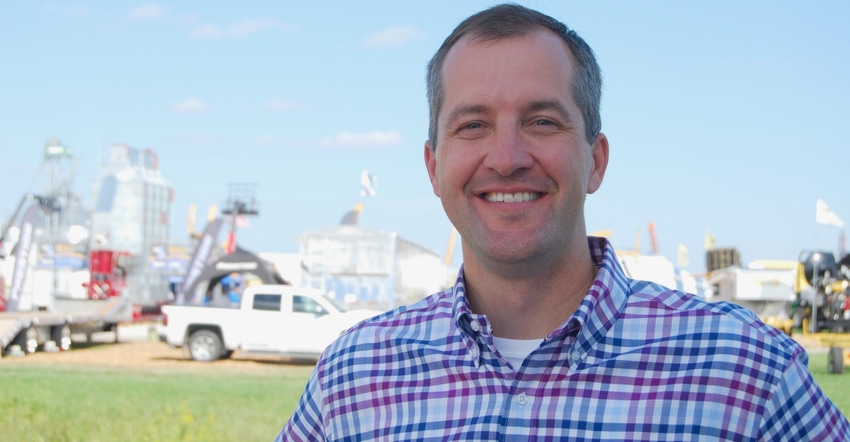November 9, 2018

Republican Mike Naig overcame a strong challenge from Democrat Tim Gannon to win the race for Iowa secretary of agriculture in the Nov. 6 election.
Naig prevailed in his bid for a full four-year term after his appointment in March to serve as state ag secretary. Iowa Gov. Kim Reynolds appointed Naig after long-time secretary Bill Northey resigned to take a top job at USDA in Washington, D.C.
Naig served for five years as Iowa’s deputy ag secretary under Northey. After being declared the winner in the Nov. 6 election, Naig praised his opponent, saying “Tim understands the challenges we face in agriculture and in rural Iowa. We don’t agree on every issue, but I know Tim Gannon cares deeply about Iowa.”
Naig received 50% of the vote compared to 47% for Gannon. A third candidate, Libertarian Rick Stewart, got 3%.
A close contest, hard-fought race
Gannon is a central Iowa farmer who previously worked for USDA in Washington. Naig grew up on a farm near Cylinder in northwest Iowa and has worked in the Iowa ag department since 2013. In June, Naig received the Republican nomination at the state convention over four other Republican candidates.
In the recent general election race, Naig gained the financial backing of Iowa’s largest farm organization, the Iowa Farm Bureau. Companies such as Deere, Monsanto and others also contributed financial support to Naig’s campaign. Iowa Farm Bureau endorsed Naig and ran ads on his behalf.
As candidates, Naig and Gannon both opposed trade-restricting tariff and trade policies initiated by President Donald Trump that resulted in retaliatory tariffs imposed by other countries on U.S. grain and meat exports to those countries.
Trade, tariff issues a concern
Trump’s trade wars with Mexico, Canada and China could cost the Iowa economy up to $2.2 billion, according to an Iowa State University study. Naig realizes that is a risk if Trump’s tariff approach doesn’t work, but said China is an unfair trade partner who has established trade barriers that have long been hurting Iowa farmers.
“China is no victim in this whole scenario,” Naig said in an October debate. However, as soybean, corn and hog prices have tumbled, he has also warned that Iowa farmers could only support the president’s trade battle “to a point.”
In the debates, Gannon supported increasing the state of Iowa’s sales tax to fund a natural resource and outdoor recreation fund. Naig opposed that idea. Naig said he’s focused on accelerating the state’s work to improve water quality and soil health and to tackle the state’s workforce needs, especially in rural Iowa.
“I know there are challenges ahead,” Naig said. “Things won’t be easy. But I’ve always believed that with the right vision, right leadership and hard work, our brightest days are ahead.”
Water quality efforts, livestock regulations
“We need to continue to make sure we’re laser-focused on improving and protecting water quality and soil health in Iowa,” Naig said. “Securing long-term funding for the first time from the Iowa Legislature earlier this year was a big accomplishment and allows us to take the next step. The legislature has given us bipartisan support to get the job done, and we will continue to focus on water quality.”
Naig believes the 12-year, $282 million funding package passed by state lawmakers will give farmers time and help ramp up conservation practices. He said it’s possible he could support a proposal to raise the sales tax three-eighths of 1 cent for clean water, outdoor recreation and natural resource preservation. He’d have to see how the remaining five-eighths of a cent might be used. “I’d want to see what the package is, if we’re talking about raising taxes on Iowans,” he said.
Iowa’s controversial system for deciding where to locate confined animal feeding operations “is doing what it was intended to do,” Naig said.
He said a statewide regulatory approach is needed. An increasing number of counties want more local control over CAFOs or a review of the 16-year-old law. He notes that the livestock industry is adopting new practices to control odor and improve neighbor relations.
“I want to take a hard look at Iowa’s livestock industry,” Naig added. “We need to be sure state programs in the livestock sector are working well. And we need to strengthen our efforts to respond to potential disease outbreaks. We need to work closely with the industry on this.”
A related area of focus is on the Veterinary Diagnostic Lab at Iowa State University, to build capacity to support Iowa’s animal agriculture.
Keep working on market development
In the campaign, Naig and Gannon discussed trade issues and the need to increase exports of crops and livestock products. “First, I hope we get USMCA, the U.S. Mexico-Canada trade agreement approved by Congress, to replace the old NAFTA,” Naig said. “We will be pushing for approval of USMCA.”
Naig said his focus, together with Reynolds and the Iowa congressional delegation, will be to continue advocating for the state’s farmers and businesses. “Our mission remains the same at the Iowa Department of Agriculture and Land Stewardship. That is, to make sure we are supporting farmers and ag and working to build new and expanded markets Iowa needs to be successful.”
He said, “We want to move Iowa and the state’s agriculture forward. My job is to serve all Iowans in representing agriculture. It’s an honor to be elected and serve as Iowa Secretary of Agriculture. We have a talented, hardworking team at IDALS and I’m grateful to have had the opportunity to serve the past five years and now to serve the next four years.”
You May Also Like




